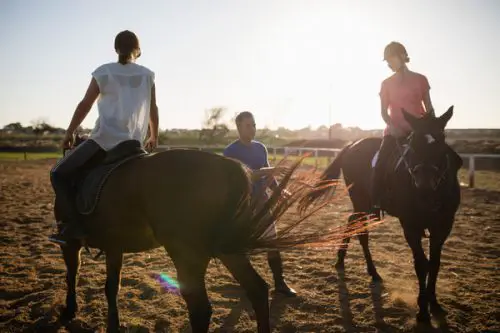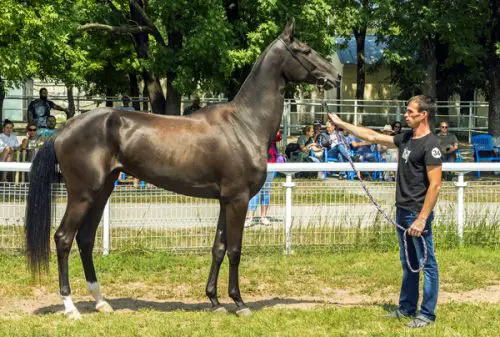The equestrian coaching profession, which has to do with teaching, training, instructing, and all forms of helping a horse or horse/rider partnership improve, is quite difficult as it can sometimes be frustrating and taxing.
As an equestrian coach, you are in a highly visible position, which gives room for a lot of criticism and scrutiny from the public; therefore, you have to be at your absolute best. A good coach should always exude positivity, be optimistic, trusting and supportive, be enthusiastic, very observant, and knowledgeable.
Qualities of a good equestrian coach
- Be able to make his/her riders believe in themselves: A good coach should be able to build the self-esteem of his/her riders, inspire them to do more than they think they can do, build them up and help them stretch the limits of their beliefs. He/she should be able to challenge them by consciously and continually putting them in situations that make them leave their comfort zone physically, emotionally, and mentally as well. He/she should make his/her riders understand that they should not just be okay with the status quo and not tolerate mediocrity in any form.
- Be passionate about his/her job: Passion has always been a very strong motivation and driving force to do something and achieve the most significant results in life. A good coach should have passion for what he/she does as this will always keep him/her going no matter how tough the job gets, how difficult it is to get the rider to catch up or how much pressure is mounted on him/her to provide results, passion for horses and riding is what will carry him/her through.

- Have integrity and display honesty: A good coach should have core values such as integrity and honesty as being a teacher puts him/her in a position to be emulated by his/her riders. Riders look up to their coaches as role models of some sort and how a coach conducts him/herself and relates with people like opponents, fans, the media and even parents of the riders is not lost on them; hence the need to be honest, have good composure and other qualities worthy of emulation.
- Have empathy: Being able to feel and understand the emotions of your riders is important in coaching as your riders get to trust you and are able to open up to you. Showing your riders that you truly understand them can help in building their self-esteem, motivate them, and make them loyal to you. Knowing where your riders are coming from and still making the coaching decisions you think are necessary makes for a good coach. There has to be a balance, though, as it would not do to be an emotional pushover.
- Incorporate fun into coaching: It is easier for riders to learn and attain peak performance when they are relaxed, and integrating fun into their lessons will help in achieving this. Finding creative ways to teach your riders on a daily basis and make their practice, lessons, and what they do throughout their training period fun makes you a good coach, and this makes the riders look forward to their lessons instead of dreading it as they are enjoying themselves while learning.
- Maintain a conducive learning environment: A good coach understands how an unfavorable learning environment can impact a rider’s performance negatively so he/she should make it his/her duty to ensure the learning atmosphere is conducive for all. Immediately dealing with bullying, ostracism and various squabbles that occur among riders, not tolerating any show of cruelty or mistreatment of others will pass a strong message to the riders that everyone is to be treated equally and well and this will create a safe and conducive environment which is necessary for peak performance and optimal learning.
- Tolerate his/her riders mistakes and failures: A good coach should make his riders understand that it is okay to make mistakes and fail as they only help you understand what you did not do right, and what you need to do differently another time. A good coach should not get pissed off and impatient when a rider makes a mistake as this will cause the rider to worry about not making more mistakes while performing instead of being relaxed to attain peak performance inadvertently lead to more mistakes.
- Be a great communicator: A good coach should always ensure that there is proper communication between him/her and his/her riders. He/she, as a coach, should listen to his/her riders the same way they listen to him/her for effective communication. Listening to your riders when they talk and really hearing what they are saying will help you truly reach them and will give you an insight on how best to help them.
- Be flexible: A good coach should always improve on their teaching abilities and understand that there are different methods and ways to approach different riders. The method that worked for rider A might not work for rider B; instead of faulting rider B, a good coach will be able to come up with a different method to teach rider B the same thing. Trying different approaches until you figure out the perfect way to reach that particular rider who is having difficulties makes you flexible. Being a rigid coach who always wants to use the same pattern yields less result when compared to being a flexible coach that tries out different methods.

- Have patience: Training and teaching is a slow and gradual process, and so it requires patience to see results. A good coach should not be in a hurry to get results as progress will be made little by little over time. Also, some riders may not catch up as quickly as others; patience is required to deal with such riders as humiliating or embarrassing them will only worsen things for them. Understanding that each rider is different from the other in how sensitive they are, in attitude, in personality, and they all have their strengths and weaknesses, how they handle criticism, and so on will help a coach exercise patience when dealing with them and know how to treat each rider to achieve maximum performance.
- Open to criticism: A good coach should be able to take criticism and negative feedback in good faith. As a coach, you are under the scrutiny and evaluation of the general public as well as the parents of your riders, being open to their feedback, negative or positive will give you room to improve on yourself and become a better coach.
- Be well-rounded: A good coach should never be satisfied with the knowledge he/she has acquired and should understand that he/she can always learn new and better ways of doing things, be willing to come out of his/her comfort zone as a professional and be open-minded like a beginner. He/she should be ready to study, practice, and learn from others as a way of constantly improving him/herself, ultimately making him/her a better coach.
Every good coach will want his/her riders to be able to perform to their very best and learn as easily as possible, and to achieve this, they need to be comfortable, relaxed, and confident in their abilities.
Getting your riders to trust you, being there to offer your support and encouragement, being kind and inspiring, never failing to correct your riders when they make mistakes, and praising and applauding their efforts when they do something right makes you a good coach.
If you are looking to become an equestrian coach or below are some links to help you along the way.

